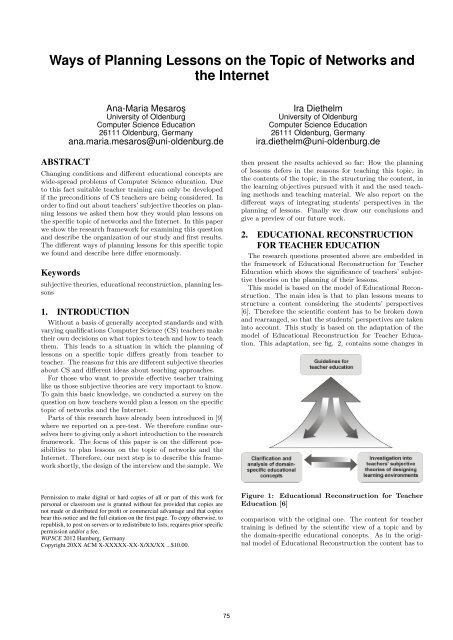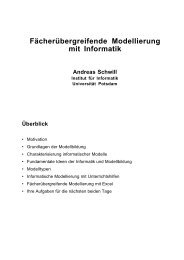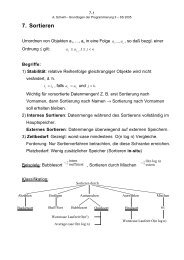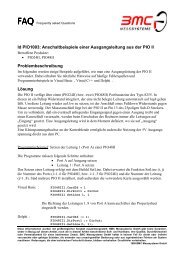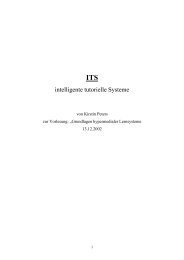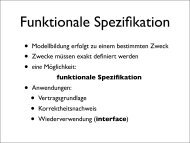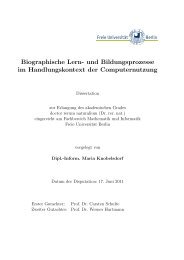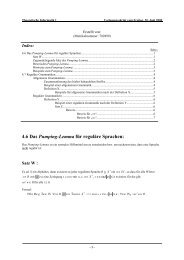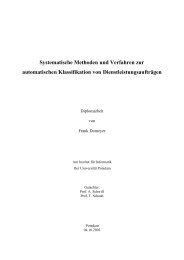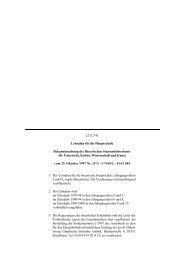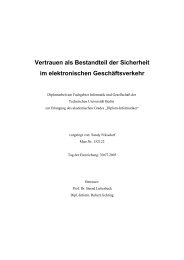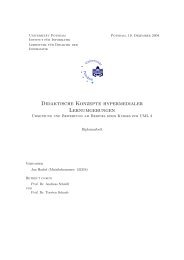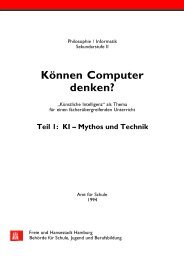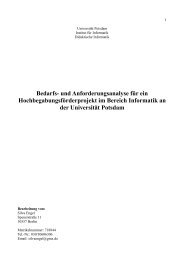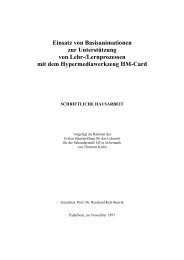Maria Knobelsdorf, University of Dortmund, Germany - Didaktik der ...
Maria Knobelsdorf, University of Dortmund, Germany - Didaktik der ...
Maria Knobelsdorf, University of Dortmund, Germany - Didaktik der ...
You also want an ePaper? Increase the reach of your titles
YUMPU automatically turns print PDFs into web optimized ePapers that Google loves.
Ways <strong>of</strong> Planning Lessons on the Topic <strong>of</strong> Networks and<br />
the Internet<br />
ABSTRACT<br />
Ana-<strong>Maria</strong> Mesaro¸s<br />
<strong>University</strong> <strong>of</strong> Oldenburg<br />
Computer Science Education<br />
26111 Oldenburg, <strong>Germany</strong><br />
ana.maria.mesaros@uni-oldenburg.de<br />
Changing conditions and different educational concepts are<br />
wide-spread problems <strong>of</strong> Computer Science education. Due<br />
to this fact suitable teacher training can only be developed<br />
if the preconditions <strong>of</strong> CS teachers are being consi<strong>der</strong>ed. In<br />
or<strong>der</strong> to find out about teachers’ subjective theories on planning<br />
lessons we asked them how they would plan lessons on<br />
the specific topic <strong>of</strong> networks and the Internet. In this paper<br />
we show the research framework for examining this question<br />
and describe the organization <strong>of</strong> our study and first results.<br />
The different ways <strong>of</strong> planning lessons for this specific topic<br />
we found and describe here differ enormously.<br />
Keywords<br />
subjective theories, educational reconstruction, planning lessons<br />
1. INTRODUCTION<br />
Without a basis <strong>of</strong> generally accepted standards and with<br />
varying qualifications Computer Science (CS) teachers make<br />
their own decisions on what topics to teach and how to teach<br />
them. This leads to a situation in which the planning <strong>of</strong><br />
lessons on a specific topic differs greatly from teacher to<br />
teacher. The reasons for this are different subjective theories<br />
about CS and different ideas about teaching approaches.<br />
For those who want to provide effective teacher training<br />
like us those subjective theories are very important to know.<br />
To gain this basic knowledge, we conducted a survey on the<br />
question on how teachers would plan a lesson on the specific<br />
topic <strong>of</strong> networks and the Internet.<br />
Parts <strong>of</strong> this research have already been introduced in [9]<br />
where we reported on a pre-test. We therefore confine ourselves<br />
here to giving only a short introduction to the research<br />
framework. The focus <strong>of</strong> this paper is on the different possibilities<br />
to plan lessons on the topic <strong>of</strong> networks and the<br />
Internet. Therefore, our next step is to describe this framework<br />
shortly, the design <strong>of</strong> the interview and the sample. We<br />
Permission to make digital or hard copies <strong>of</strong> all or part <strong>of</strong> this work for<br />
personal or classroom use is granted without fee provided that copies are<br />
not made or distributed for pr<strong>of</strong>it or commercial advantage and that copies<br />
bear this notice and the full citation on the first page. To copy otherwise, to<br />
republish, to post on servers or to redistribute to lists, requires prior specific<br />
permission and/or a fee.<br />
WiPSCE 2012 Hamburg, <strong>Germany</strong><br />
Copyright 20XX ACM X-XXXXX-XX-X/XX/XX ...$10.00.<br />
75<br />
Ira Diethelm<br />
<strong>University</strong> <strong>of</strong> Oldenburg<br />
Computer Science Education<br />
26111 Oldenburg, <strong>Germany</strong><br />
ira.diethelm@uni-oldenburg.de<br />
then present the results achieved so far: How the planning<br />
<strong>of</strong> lessons defers in the reasons for teaching this topic, in<br />
the contents <strong>of</strong> the topic, in the structuring the content, in<br />
the learning objectives pursued with it and the used teaching<br />
methods and teaching material. We also report on the<br />
different ways <strong>of</strong> integrating students’ perspectives in the<br />
planning <strong>of</strong> lessons. Finally we draw our conclusions and<br />
give a preview <strong>of</strong> our future work.<br />
2. EDUCATIONAL RECONSTRUCTION<br />
FOR TEACHER EDUCATION<br />
The research questions presented above are embedded in<br />
the framework <strong>of</strong> Educational Reconstruction for Teacher<br />
Education which shows the significance <strong>of</strong> teachers’ subjective<br />
theories on the planning <strong>of</strong> their lessons.<br />
This model is based on the model <strong>of</strong> Educational Reconstruction.<br />
The main idea is that to plan lessons means to<br />
structure a content consi<strong>der</strong>ing the students’ perspectives<br />
[6]. Therefore the scientific content has to be broken down<br />
and rearranged, so that the students’ perspectives are taken<br />
into account. This study is based on the adaptation <strong>of</strong> the<br />
model <strong>of</strong> Educational Reconstruction for Teacher Education.<br />
This adaptation, see fig. 2, contains some changes in<br />
Figure 1: Educational Reconstruction for Teacher<br />
Education [6]<br />
comparison with the original one. The content for teacher<br />
training is defined by the scientific view <strong>of</strong> a topic and by<br />
the domain-specific educational concepts. As in the original<br />
model <strong>of</strong> Educational Reconstruction the content has to


